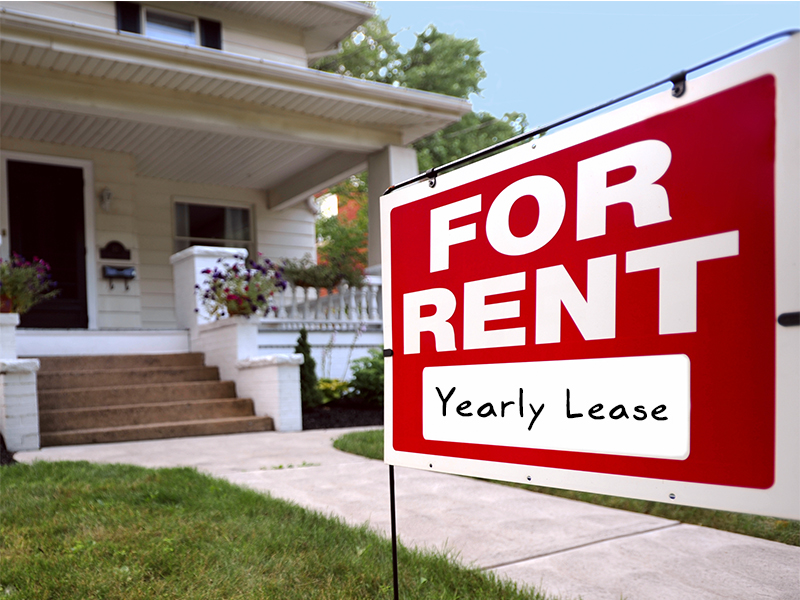Legislation to make Oregon the first state in the nation to adopt statewide rent control and make it more difficult for landlords to evict tenants without a reason has evoked swift and stern local reaction.
The Oregon Senate voted 17-11 Tuesday to adopt Senate Bill 608, which allows landlords to raise rent no more than 7 percent per year, plus the annual change in the Consumer Price Index (CPI). While the bill provides an exemption for rental properties that are less than 15 years old, the measure also reduces a landlord’s ability to evict tenants without a reason after they have lived in the building for a year.

“This will do nothing to alleviate any housing shortage,” former Lincoln City mayor and landlord Don Williams said. “Instead, it will cause fewer people to become landlords and drive landlords to sell or switch to year-to-year leases.”
“The questions no one seem to be asking are: ‘Why do we have fewer homes for rent than renters?’ and ‘Why aren’t landlords fighting to create or build rentals if there is such a demand?’
“I can answer that as a former landlord of both single-family and apartment rentals — Oregon’s landlord/tenant laws are so tilted against landlords as to make the liabilities greater than the profit. Business 101 says that is a prescription for failure.
“Now, the state of Oregon is barreling headlong into restricting the free market and the market will respond with one of three choices: 1) Go along with the law because it makes no significant financial impact; 2) Modify rental agreements that will create greater pressure on would-be tenants; 3) Leave the rental business.”
“This will just add to the housing shortage and ultimately increase the number of homeless in the state.”
Lincoln City resident Matthew Gerber
Proponents of the bill say it will prevent “price-gouging” and help address the rampant homelessness of children in the state by making it easier for Oregonians to stay in their homes.
Landlord Joe Barnes, who rents over 100 units, disagrees:
“I’m going to just raise rents every year by 7 percent,” he said. “I don’t usually raise rents on current tenants, so my tenants can thank this law for the increase.
“I am also revamping the application process and will be charging a larger deposit to help offset the potential of loss of rent for 60-day notices. Most tenants don’t pay rent after a notice. Higher deposits will help mitigate that. Other changes will evolve. Unfortunately, none will be in favor of the tenant. Rents will ultimately go up across the board.”
Williams summarized the situation:
“As written, SB 608 limits rent increases to 7 percent and a percentage of the Consumer Price Index and imposes a 60-day eviction notice period on landlords,” he said. “To the majority of people that are renters vs. the number of landlords, this will seem like a great idea. But much like the ever-increasing imposed minimum wage, they do not reflect reality and will only end up hurting those that it purports to help.”
The bill will now move to the Oregon State Legislature House of Representatives.
“SB608 will cause negative consequences for renters and decrease the number of people investing in rental properties,” Williams said. “And, much like the minimum wage argument, it’s not a moral question, it’s a math question.”
EDITOR’S NOTE: Homepage welcomes contrary comment from renters and local rental agencies regarding the adoption of SB608 and will update this post as warranted.
Senate Bill 608
For-Cause Eviction
- Establishes a for-cause eviction standard after the first year of occupancy.
- Landlords can continue to evict for a tenant-based cause (current law – i.e., non-payment, violation of the rental agreement, outrageous conduct, etc.).
- Adds new landlord-based for-cause reasons to evict a tenant (sale to a person who will move in, landlord or family member move-in, repair or renovate, and demolish or remove unit from residential use).
- If landlord uses one of these four landlord-based reasons, they must provide the tenant with 90-day notice and relocation expenses in the amount of one month’s rent.
Exceptions
- Small landlords (four or fewer units) do not have to pay relocation expenses.
- Landlords who live on the same property as their tenant (owner occupied, two units or less) may still use a no-cause eviction at any time.
Month-to-Month Tenancies
- For the first 12 months of occupancy, a landlord may terminate the tenancy without cause with a 30-day notice.
- After the first 12 months of occupancy, a landlord may only evict a tenant for cause, by using an existing tenant-based reason or by using one of the four new landlord-based reasons.
Fixed-Term Tenancies
- For the first 12 months of occupancy, a landlord may terminate a fixed-term tenancy without cause by giving a 90-day notice.
- After the first 12 months of occupancy, the fixed-term lease will automatically roll over to month-to-month unless the landlord has a tenant or landlord-based reason to terminate.
Exceptions:
- A fixed-term lease might not automatically roll over at the end of the fixed term per landlord discretion if the tenant has violated the terms of the rental agreement three separate times during a 12-month period, with written warnings for each violation given contemporaneously with the violation.
Annual Rent Increase
- Landlords may increase rent by no more than 7 percent plus CPI in a 12-month period.
- Maintains current law regarding rent increases: prohibits rent increases in first year of month-to-month tenancy and requirement that landlords give 90-day notice of rent increases.
Exceptions:
- New Construction: A landlord may increase the rent above 7 percent plus CPI in a 12-month period if the certificate of occupancy was issued less than 15 years ago.
- New Tenancy: If the previous tenant vacated the unit voluntarily or their tenancy was otherwise terminated in compliance with other applicable law, the landlord may reset the rent on the new tenancy without limitation.
- If the previous tenant received a no-cause notice or their fixed-term lease was terminated and not allowed to roll over, they did not leave voluntarily and the landlord may only increase the rent on the unit by 7 percent plus CPI above the previous rent.
- Subsidized Housing: If the landlord is providing reduced rent to the tenant as part of a federal, state, or local program or subsidy, they are exempt.
Enforcement
- If a landlord violates the new provisions, they are liable for three months’ rent plus actual damages.
SOURCE: Acorn Property Management









